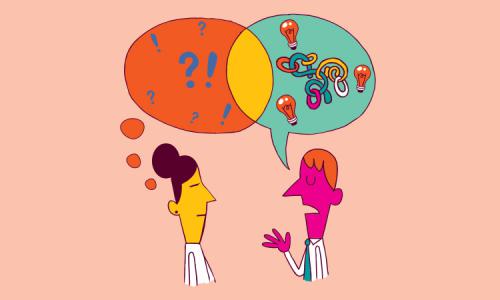 In my previous blog posts, I have discussed ways in which we build caring, respectful relationships, and why they are so important for teaching and learning. As I pondered this idea in terms of how we work with our students, I came to realize why I have long bristled when folks talk about “teacher training” or “scaling up” educational reform strategies. “Teacher training” is something done to teachers. Creating and nurturing respectful relationships with teachers is antithetical to the top down notions of “teacher training” or “scaling up.”
In my previous blog posts, I have discussed ways in which we build caring, respectful relationships, and why they are so important for teaching and learning. As I pondered this idea in terms of how we work with our students, I came to realize why I have long bristled when folks talk about “teacher training” or “scaling up” educational reform strategies. “Teacher training” is something done to teachers. Creating and nurturing respectful relationships with teachers is antithetical to the top down notions of “teacher training” or “scaling up.”
There is a difference between training and education. The former comes largely from a business paradigm, or the old factory model of education. According to BusinessDictionary.com “training” is defined as:
Organized activity aimed at imparting information and/or instructions
to improve the recipient’s performance or help him or her attain a required level of knowledge or skill.
Education, on the other hand, is defined by Dictionary.com as:
The act or process of imparting or acquiring general knowledge, developing
the powers of reasoning and judgment, and generally preparing oneself
or others intellectually for mature life…
or, from Oxford:
An enlightening experience.
How many people do you know who would describe a “training day” as “enlightening”?
Recently, the READ East Harlem literacy coaches have been focusing on Cornelius Minor’s book, We Got This. Minor discusses how we can create an engaging, equitable environment for students. He states, “Our journey starts with an understanding that no great good can be done for a people if we do not listen to them first. Powerful teaching is rooted in powerful listening,” and, I would add, powerful listening is rooted in respect. In fact, the words “respect” and “relationships” make frequent appearances throughout Minor’s thoughtful book; and while Minor is referring to our work with our kids, this notion of listening applies to our work with teachers as well. If we want to work with them to get smarter about teaching and learning, we need to listen first and foremost. And, we need to be respectful of who they are, what they know, and what they think they need to be successful with their kids. Only then can we work to co-construct effective curricula and strategies, building on and extending what they already know and do, and enabling both teachers and students to come to know and understand more about literacy, equity, access, and the world in which we live.
 If we believe that inquiry is at the heart of powerful, masterful education for our students, if we must listen to their thoughts, ideas and questions to co-construct meaningful learning experiences and inquiry projects based on their interests and concerns, so it must be with teachers as well. In her book, Leading Adult Learning, Eleanor Drago-Severson says, “It must be a given that if schools are to adapt to current conditions, they need to be places where the adults as well as the children can grow…[they require] new ways of working, learning and leading together, as opposed to training on specific topics and acquiring discrete skills.” (p. x) She goes on to say that, “to shape schools and schools systems more effectively as genuine mentoring communities – contexts for collaborative learning” – educators [need to] “support and challenge each other to grow.”
If we believe that inquiry is at the heart of powerful, masterful education for our students, if we must listen to their thoughts, ideas and questions to co-construct meaningful learning experiences and inquiry projects based on their interests and concerns, so it must be with teachers as well. In her book, Leading Adult Learning, Eleanor Drago-Severson says, “It must be a given that if schools are to adapt to current conditions, they need to be places where the adults as well as the children can grow…[they require] new ways of working, learning and leading together, as opposed to training on specific topics and acquiring discrete skills.” (p. x) She goes on to say that, “to shape schools and schools systems more effectively as genuine mentoring communities – contexts for collaborative learning” – educators [need to] “support and challenge each other to grow.”
The single most effective way I have found to do this, and to establish long-term mentoring relationships along the way, is through study groups focused on classroom inquiry. Starting with listening to what it is that teachers want to know, as well as their issues and concerns, classroom inquiry allows teachers to develop a question which grows from their practice, to form a hypothesis, and to collect data in the form of observations, tasks and assignments, and student work or products. After reflecting on their teaching and their findings, the results feed back into their practice. Teachers come to understand the process, which fosters reflection-on-action, as well as reflection-in-action (Schoen), and allows them to hone their practice in a way that strengthens both teaching and learning. It’s exciting, too! Many teachers come to embrace the study group, value the time spent, and look forward to the collaboration and feedback from colleagues. The process, itself, becomes sustainable and begins to change the school culture, as well as the way teachers see themselves, their students, their colleagues, their craft, and their world.
There are no short cuts here, no “scaling up” this kind of teaching and learning. Relationships are not scalable; neither is thoughtful, reflective teaching. But they are important building blocks for the success of individual students, teachers and school communities. In the Architecture of Trusting Relationships created by Rosanne Kurstedt and the READ East Harlem community, “humility,” “openness,” “flexibility,” and “no judgment” are the foundation of trusting relationships, and along with powerful, active listening, they can help us create the kinds of schools that provide the opportunities for both students and teachers to learn and grow.
